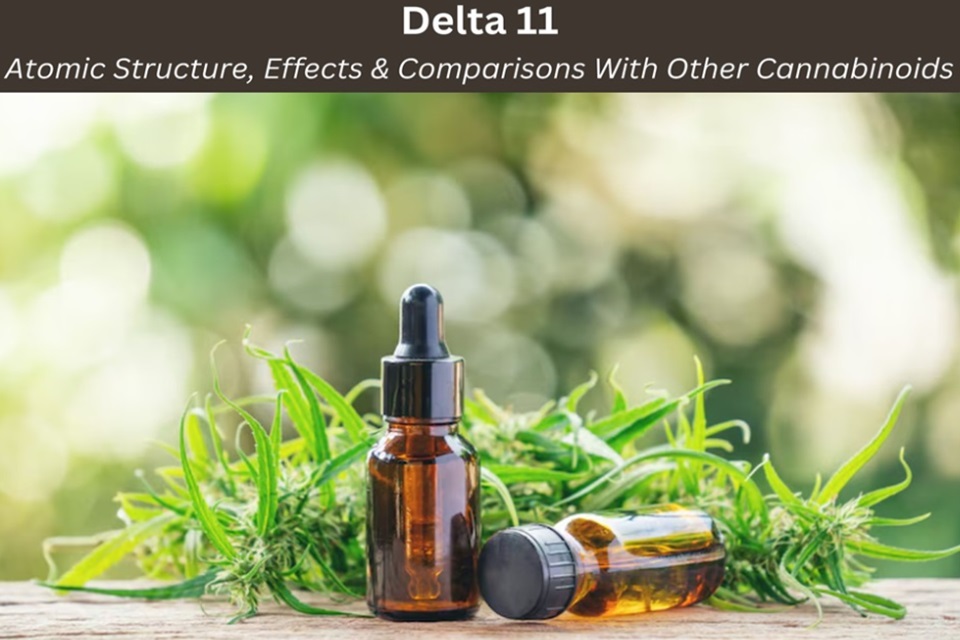A Guide To Delta 11: Atomic Structure, Effects & Comparisons With Other Cannabinoids
Cannabinoids are compounds found in the cannabis plant, each with unique properties and effects. Delta 11 is gaining attention for its distinct characteristics. This guide will delve into Delta 11, its atomic structure, its effects, and how it compares to other well-known cannabinoids like Delta 9, Delta 8, and Delta 6.
What Is Delta 11?
Delta 11 is a lesser-known cannabinoid derived from the cannabis plant. Unlike the more familiar Delta 9 THC, which is the primary psychoactive component in cannabis, Delta 11 is part of a growing list of cannabinoids being studied for their unique effects and potential benefits.
Origin
Delta 11, like other cannabinoids, is produced naturally in the cannabis plant. It is typically found in small quantities, making it less common and less studied than some of its counterparts. Advances in cannabis research and extraction methods are now making it easier to isolate and study these minor cannabinoids.
Atomic Structure
The atomic structure of Delta 11 is similar to that of other cannabinoids, featuring a complex arrangement of carbon, hydrogen, and oxygen atoms. Specifically, it has the same molecular formula as Delta 9 THC (C21H30O2) but differs in the placement of a double bond within the carbon chain. This slight variation in structure can lead to differences in how it interacts with the body’s endocannabinoid system, which in turn affects its overall impact.
Effects
The effects of Delta 11 are still under investigation, but early reports suggest that it may offer a different experience compared to Delta 9 THC. Users have described a milder psychoactive effect, which could be beneficial for those seeking the therapeutic benefits of cannabinoids without the intense high associated with Delta 9 THC. Additionally, it may provide similar benefits, such as pain relief, anti-inflammatory properties, and anxiety reduction.
Comparison With Other Cannabinoids
Delta 11 Vs Delta 9
Delta 9 THC is the most well-known and abundant cannabinoid in cannabis, famous for its potent psychoactive effects. In contrast, Delta 11 is less psychoactive, potentially offering a more subtle high. This makes Delta 11 appealing to those who want the benefits of THC without the overwhelming intensity.
Delta 11 Vs Delta 8
Delta 8 THC is another cannabinoid that has gained popularity for its milder effects compared to Delta 9 THC. Delta 8 is known for providing a clear-headed high with reduced anxiety and paranoia. Delta 11 appears to be even milder than Delta 8, which could make it suitable for users looking for minimal psychoactive effects while still benefiting from the therapeutic properties of THC.
Delta 11 Vs Delta 6
Delta 6 is one of the least common cannabinoids, with limited research available. Its effects and properties are not as well understood as those of Delta 9 or Delta 8. Comparatively, Delta 11, although also less studied, is gaining more attention and is likely to be more researched in the near future, providing clearer insights into its effects and potential uses.
Is Delta 11 Legal Around The World?
The legal status of Delta 11 varies by country and even by region within countries. In many places where cannabis and its derivatives are regulated, Delta 11 may fall into a legal gray area due to its similarity to Delta 9 THC. In the United States, for example, the legality can depend on whether Delta 11 is derived from hemp (which is federally legal) or from marijuana (which is illegal at the federal level but legal in some states). It’s important to check local laws before using or purchasing Delta 11 products.
Can We Detect Delta 11 In A Drug Test?
Standard drug tests typically screen for Delta 9 THC and its metabolites. Since Delta 11 is chemically similar, it is possible that it could be detected by these tests, though this is not guaranteed. The lack of widespread research means there’s limited information on how Delta 11 metabolites behave in the body and how long they remain detectable. Therefore, caution is advised for those who may be subject to drug testing.
In Summary
Delta 11 is an intriguing cannabinoid with a unique profile that distinguishes it from more commonly known compounds like Delta 9 and Delta 8 THC. As research continues, we can expect to learn more about its effects, benefits, and potential uses. For now, it offers an alternative for those seeking milder psychoactive experiences with therapeutic benefits.
FAQs
What is the main difference between Delta 11 and Delta 9 THC?
Delta 11 is less psychoactive than Delta 9 THC, offering a milder high.
Is Delta 11 legal in the United States?
Delta 11’s legality depends on whether it is derived from hemp or marijuana, as well as state laws.
Can Delta 11 be detected in standard drug tests?
It is possible but not guaranteed, as most tests are designed to detect Delta 9 THC.
What potential benefits does Delta 11 offer?
Delta 11 may provide pain relief, anti-inflammatory effects, and anxiety reduction with milder psychoactive effects.





